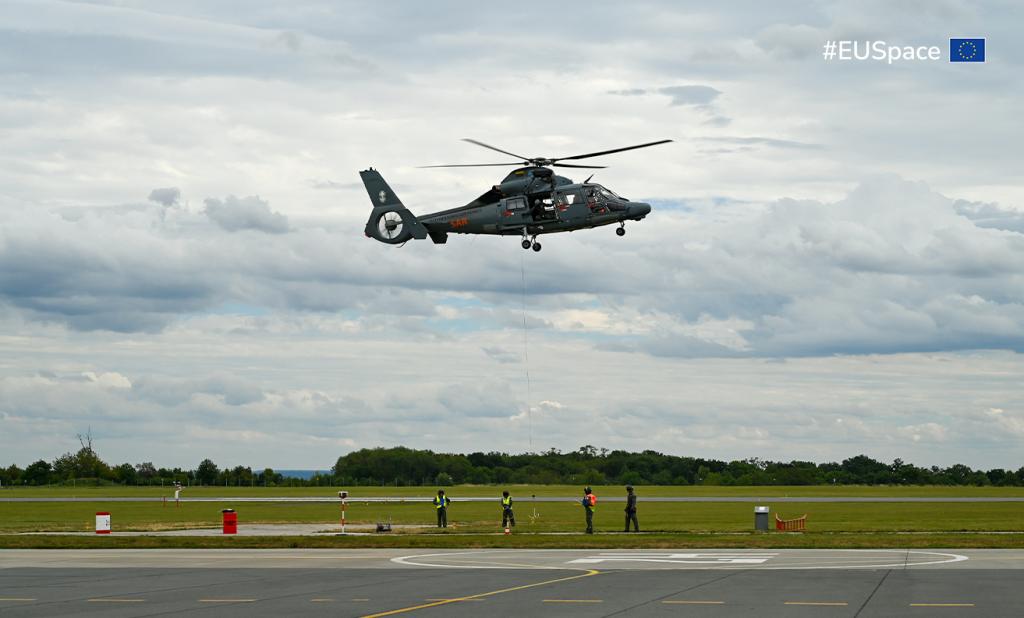The Galileo SAR Takes Centre Stage at Europe’s Largest Search and Rescue Exercise

Between 4 and 8 August, Prague became the centre of international search and rescue collaboration as the Czech Republic hosted SAR Meet 2025, a five-day exercise combining live aerial challenges with expert exchanges. Organised by the European Commission, the Czech Army, and EUSPA, the event brought together more than 200 participants from ten countries.
Central to the event was the Galileo Search and Rescue (SAR) Service, operated by EUSPA. The system includes a Forward Link functionality, which relays distress signals from 406 MHz beacons, and a unique Return Link Service (RLS) – an innovation that lets those in distress know their call for help has been received. This two-way capability, unique to Galileo, supports faster response coordination and can reduce anxiety in emergencies.
The free-of-charge SAR RLS service offers global coverage at sea, in the mountains, across the desert and in urban areas. To leverage the service, all one needs is a Cospas-Sarsat RLS-compatible beacon.
Galileo’s growing role in emergency response
EUSPA hosted the official symposium on 6 August at its headquarters in Prague. The agenda included technical insights and operational experiences from leading SAR entities, including experts from ten European countries and Canada. Among the highlights were updates on Galileo SAR’s evolution and its growing role in both civilian and military contexts.
Speaking at the event, EUSPA’s Chief Operating Officer, Pascal Claudel, emphasised: “Galileo’s SAR capability is a major technological milestone of the EU Space Programme. It enables rescue teams to respond with greater speed and precision, while offering vital reassurance to those in distress.”
Beyond the symposium, SAR Meet 2025 was a dynamic field exercise, hosted by the Czech Air Force’s 243rd Helicopter Squadron at Kbely Air Base. Pilots, hoist operators, and SAR crews competed in simulated challenges such as navigation, winching, and drone-assisted rescue. These drills tested operational readiness and promoted interoperability among European rescue units.
While one focus was technical performance, another was on sharing best practices and aligning procedures to better integrate space-based services like Galileo SAR into field operations.
As Europe faces growing challenges – from extreme weather to remote-area incidents – space-based search and rescue services are becoming essential public assets. Galileo SAR, as part of the global Cospas-Sarsat system, is operational 24/7 and freely accessible worldwide. With more than 60,000 lives saved globally through Cospas-Sarsat to date, Galileo’s advanced features are expected to further increase survival rates and reduce search times.
About Galileo
Galileo, the EU´s Global Navigation Satellite System (GNSS), provides improved navigation, positioning and timing information. More than 4 billion users are already benefitting from Galileo.
The Galileo Programme is owned by the EU. The European Commission, as the Programme Manager, oversees the implementation of all activities. EUSPA is responsible for the operational management of the services, ensuring that they are delivered with the defined performance and without interruption. Galileo's system design and system evolution are entrusted by EUSPA to ESA .
Media note: This feature can be republished without charge provided the European Union Agency for the Space Programme (EUSPA) is acknowledged as the source at the top or the bottom of the story. You must request permission before you use any of the photographs on the site. If you republish, we would be grateful if you could link back to the EUSPA website.